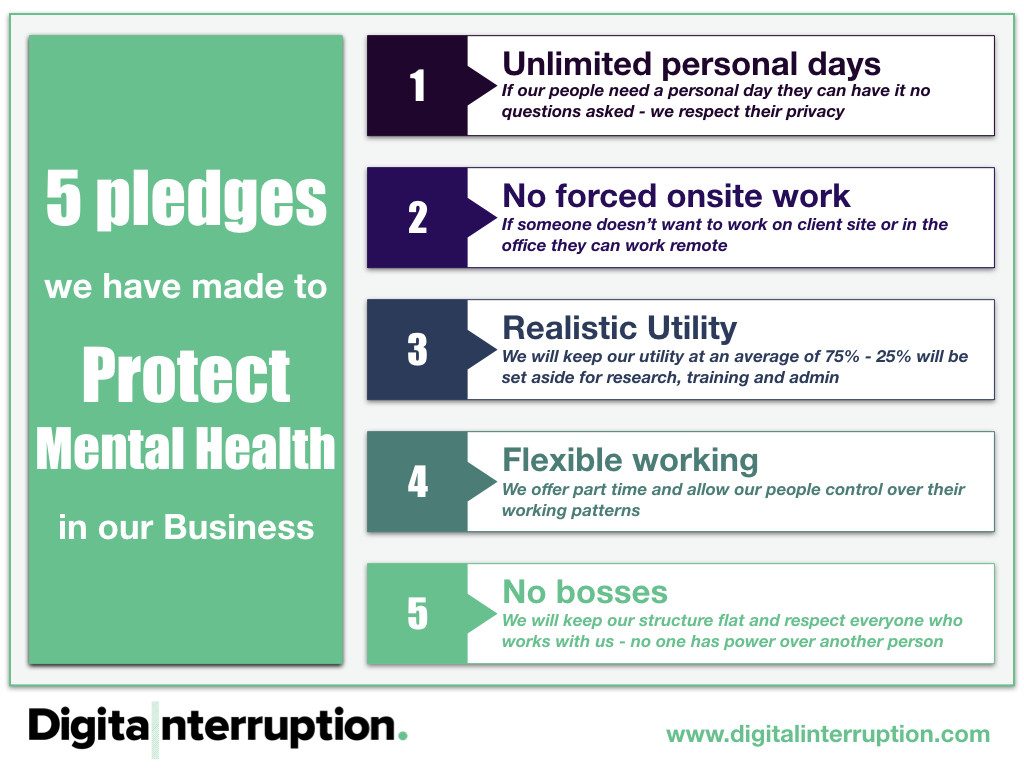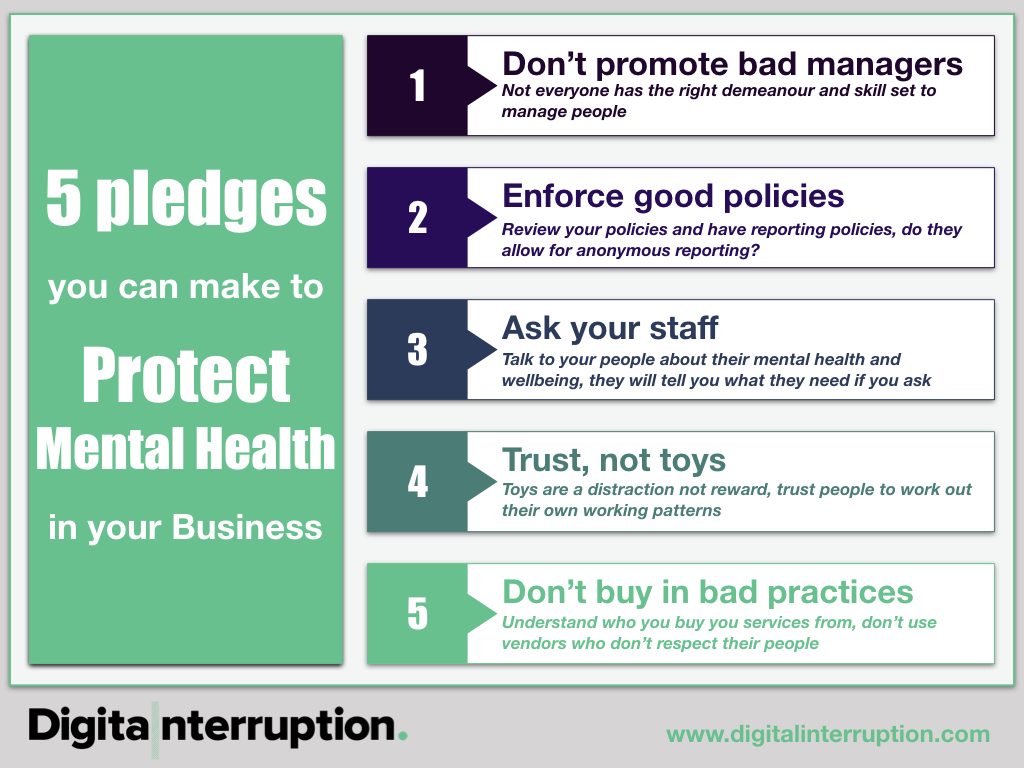By Saskia
This week I gave the introductory talk at the Techs and the City event about mental health. I have a lot of experience in this area and have deep concerns about how mental health is handled, both generally in the tech industry, but specifically in cybersecurity.
The reception to all the talks was amazing, I was asked to turn mine into a blog post. This is the post. This is not just my experience but a call to action, so if you have the time please read to the end.
Over my career I have worked with many people. I have worked with many people because I have never had a permanent job. I have always been a contractor.
I have worked in film where mental health and addiction is glamorised and romanticised, security where it is accepted (but only if you’re l33t enough) and tech where it’s rife.
I have worked in business transformation where I have observed how sick organisations with toxic cultures destroy people. I have worked in the Mental Health Trust where I saw the true impact of this first hand and that there is nothing romantic or glamorous about people in crisis.
I have lost friends and family to suicide.
I have literally grown up with mental illness. My mother has battled mental illness since she was 14. This is most of her life and all of mine. She is a PhD. She is angry. She has a right to be angry. She became ill at a time when it was stigmatised. She wasn’t able to work, she lost her place in society and had to fight to get it back.
This brilliant cartoon by Posy Simmonds was published in the Guardian in 1984. In over 30 years it looks like little has changed in how society responds to suffering.

Society needs to do better.
There are many conditions we need to consider when discussing mental health. Developmental conditions such as Autism, neurological conditions such as ADHD, anxiety disorders such as OCD and conditions like addiction.
I have ADHD. It can be like having a super power.

It gives me (a lot of) energy, drive, stubbornness an over inflated sense of justice, analytical thinking (I question EVERYTHING and have no intention of following the rules) a frighteningly good memory (obsessive) and a high IQ (though also dyslexia, so if its written down you may have zero idea what I’m trying to say).
But this isn’t the ugly side of the condition. And let’s not hide from this. Mental Health can be ugly. The ugly side effects me and by proxy the people around me. Without medication it is unmanageable and it is devastating.

It affects my ability to sleep. My body will be collapsing, but I still wont be able to switch off. It will literally turn off the part of my brain that says I am hungry and make me gag constantly. My lowest BMI was less than 16. Waiting for treatment in the UK literally nearly killed me, because despite what some doctors think, ADHD doesn’t just go away when you turn 18.
I have had several times in my life where I’ve been genuinely worried I’ll be sectioned for anorexia when all I needed was Ritalin.
I’ve constantly had to prove my condition. Even to doctors.
It makes me frustrated, distracted, noise sensitive, light sensitive, obsessive and tactless. It makes me angry. It makes me heckle, it makes me rude, it makes me flit between subjects and loose focus easily. None of which I am remotely aware of without my medication.
The irony that my company is called Digital Interruption is not lost on me.
We have a running joke about how we settle disputes at Digital Interruption.

But when your’ mental health is messing with your brain, it really can feel like you’re stood in a hole with one arm tied to your body, while the whole world; doctors, colleagues, managers, HR, family, friends, are hitting you with a sack of rocks.
I can only get over the blockers to get to the super powers of my neurological condition with the right environmental conditions. Otherwise the blockers just take over. I have been able do this because I’ve always been a contractor so I’m judged on outputs and can set my own rules.
I am successful because I was a contractor so I was judged on outputs and could set my own rules.
Now Jay and I run Digital Interruption we want other people to be able to have permanent, safe and stable jobs and still be the best they can be. We want to empower them. We want them to be celebrated for their output. We want them to set their own rules.
We don’t want to make them stand in a hole and hit them with a sack filled with rocks.
We have made a conscious decision to not just encourage mental health but to defend it.

In our varied careers we have worked with people who are on the Autism Spectrum, have Asperger’s, ADHD, OCD, Bi Polar, are agoraphobic or have anxiety disorders to name a few. All of these people have been talented. All of them have contributed. Some have needed support. Others have given support. Some once needed it and now are paying it forward.
We all need to pay it forward.
We are a small company but our ethics carry us. As we grow this gets harder because we have to resource our work, but our resources have names. They have families. And they have lives.
And Digital Interruption is just that. Interruptive. We are a disruptive business model founded on ethics. We don’t bully and bullshit our customers and we don’t bully and bullshit our people.
Where others hire juniors we hire seniors*. Where they push their people to 100% util we offer unlimited holiday. Where they suggest on site, we recommend remote.
But policies mean nothing if you don’t implement and enforce them. Mental health first aiders are useless if your managers and HR teams are not educated, or worse bullies. Bad managers and bad HR teams make you less secure. Disgruntled and desperate staff are a risk to your business.
We’re a consultancy, which means we have to work with clients. Responding to clients often means sending consultants on site all over the country. But this can lead to burn out, which really effects mental health. If you constantly take people away from their family, their friends, their support networks and routines, and dump them in a Premier Inn in Slough you will break them.
Work should be safe. Constant and last minute onsite scheduling of consultants is irresponsible.
To protect against this as much as we can, Digital Interruption have some clear policies but where we don’t have a policy, as we grow we have made pledges.

1. Personal Days – we will continue our policy of unlimited personal days, so no one has to call in sick. This means time off work, not time at work doing personal things.
If you need a personal day you can have it. We respect your privacy.
2. No forced (or manipulated) on site work – if someone doesn’t want to work on client site or in the office they can work remote. We can balance this with the right mix of consultants and encourage clients to opt for remote jobs.
3. Realistic utility – we will keep our utility at an average of 75%. 25% will be set aside for research, training and admin. This will be spread across the year.
We are small and we cant turn work away, but Jay and I both know all too well what burn out feels like.
4. Flexible working – where we can we will be flexible. This means flexible, not just shifting peoples start and finish times. If this means working odd hours, or working in shorter bursts we will do everything we can to enable this. We will try to offer day night reversal if needed, especially if we have colleagues observing ramadan.
We offer part time to our consultants.
5. Horizontal structure with no bosses – we will keep our structure flat and respect everyone who works with us. The word boss is not relevant, not used and never will be. No one has power over another person. We are not resources and we are not profit margins, we are colleagues and we are people.
And there are things you can do too.

1. Don’t promote bad managers – just because someone was first in the door, or they’ve been with you a long time doesn’t mean they can manage people. It can better to create a more senior technician or consultant role to promote and empower rather than to elbow the wrong people in to management positions.
Not everyone has the right skills and demeanor to manage others.
2. Enforce good policies – review your polices. Make sure they are communicated across the organisation. Make sure they are enforced.
And mostly, review your reporting policies. If you don’t have the facility for anonymous reporting ask your self why. Reporting any abuse including mental health abuses is frightening. Bullying and harassment lead to breakdowns in Mental Health. The very action of putting an identity to a report may make it impossible for someone to do.
Make reporting easy.
3. Ask your staff – if you’re not talking to your people about their health and well-being you should be. They will tell you what they need if you ask them.
Consider an anonymous survey. Do you know how many people in your organisation are living with mental health issues. Do you know if the environment and culture you are fostering is adding to a breakdown in mental health.
Is your employee turn over high?
There are platform such as Report+Support by Culture Shift that offer anonymous reporting, direct help and instant guidance in to users in complete confidence.It’s currently being rolled out across a number of universities. I’m very proud to be their DPO.
If you are a larger business, look in to platforms that facilitate this.
4. Trust, not toys – a game of Ping-Pong never helped my ADHD and Nerf guns and drones whizzing around my head make it worse. Working from home on the other hand can be a god send if I’m struggling to concentrate.
Be mindful that not everyone likes rewards such as social events. Drinking in the office and pressure to attend after work drinks or social activities can make things like anxiety and avoiding self-medication or addition triggers worse.
5. Don’t buy in bad practices – understand who you buy your services from. Don’t use, companies who don’t respect their people.
There are responsible and ethical vendors out there, find them. Ask them for their policies, check on platforms like glass door to see what their people say about them. If you know people who work for there or who used to work there ask them.
If you have someone coming to your site at 9am on a Monday morning ask the scheduler where they are coming from. Are they being asked to travel on a Sunday or get up at 4am on a Monday morning? How often are they required to do this? Have you been up-sold on-site because it costs more?
If a company doesn’t treat its people well you don’t want to hire them. Not just because it’s a bad thing to do, but because you don’t want tired, burned out and resentful people poking around with your tech.
*We’ve been asked to clarify why we don’t currently hire juniors. At the moment we’re too small to dedicate the time and resources to provide the mentorship juniors deserve. We believe this would put them under additional pressure and/or stress to perform above their current skills set.

